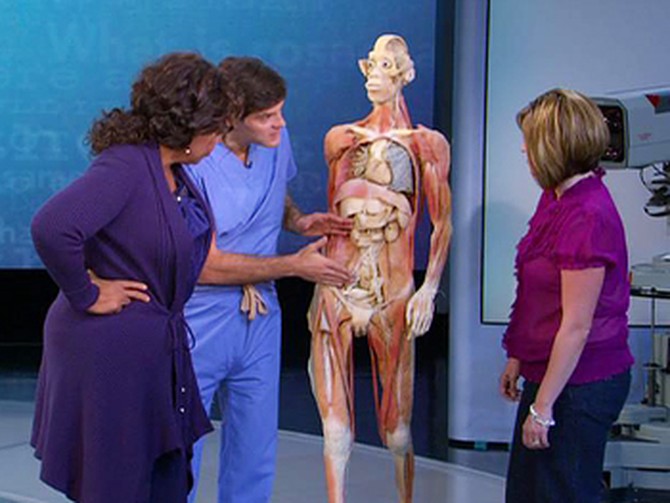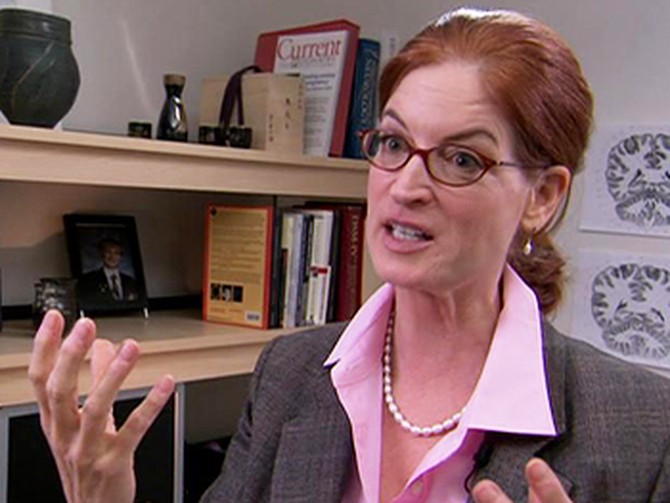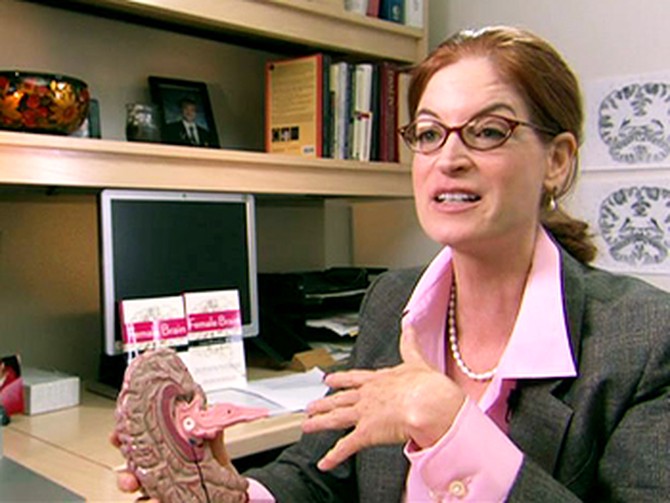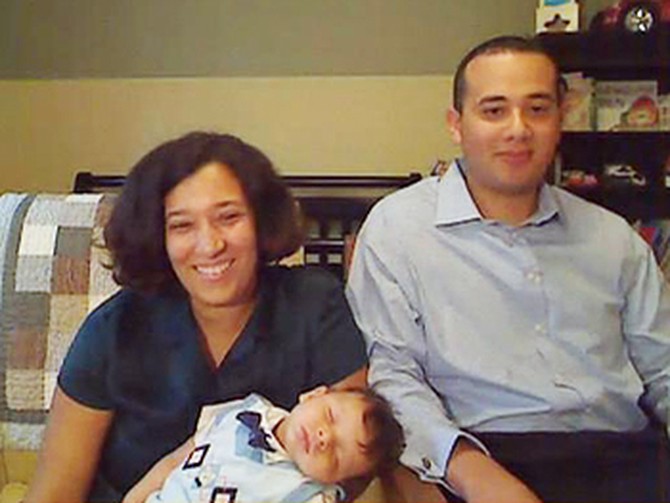Are Men and Women Different?
By Dr. Mehmet Oz

On most days, the studio audience at The Oprah Winfrey Show is almost entirely women…with just a few husbands, brothers and boyfriends sprinkled in. But today the audience comprises 170 men and 170 women. "A lot of estrogen…a lot of testosterone," Oprah jokes.
What brings today's balanced crowd? Dr. Oz is answering their burning questions about the differences between men and women.
First up is Carrie, who just can't hold her question in any longer. "As women, we all are waiting in line to go to the bathroom. And so we're dying to know: Do women have smaller bladders?"
Dr. Oz says the answer is yes, and he demonstrates why by using a female model from Bodies…The Exhibition. A woman's bladder is located right underneath her uterus. "What's happening in women is you have to make room for the uterus," he says. "And so the only place you can get it from is from the bladder."
What brings today's balanced crowd? Dr. Oz is answering their burning questions about the differences between men and women.
First up is Carrie, who just can't hold her question in any longer. "As women, we all are waiting in line to go to the bathroom. And so we're dying to know: Do women have smaller bladders?"
Dr. Oz says the answer is yes, and he demonstrates why by using a female model from Bodies…The Exhibition. A woman's bladder is located right underneath her uterus. "What's happening in women is you have to make room for the uterus," he says. "And so the only place you can get it from is from the bladder."

The next topic comes from Dr. Oz himself. "All along, I have been saying, 'Do not get hair transplants.' Oftentimes, when my friends and patients have gotten them, they come back to me and it looks like a farmer planted a row of corn there!" he says. "It's pretty obvious they're not natural."
Dr. Oz says he's changed his mind about hair transplants after seeing a procedure called follicular unit transplantation performed by his Columbia University colleague Dr. Bob Bernstein.
First, Dr. Bernstein determines if the patient is a good candidate for the procedure. If he is eligible, the first step is to use a local anesthetic to numb his scalp. Then, Dr. Bernstein removes a thin strip of hair from the back of the patient's head and sews the incision shut. The scar will be covered by hair from above.
Using powerful microscopes, Dr. Bernstein and his team then carefully slice up this strip of scalp into thousands of skin grafts called follicular units. Each follicular unit contains one to three hairs. Then, in a meticulous process that can take as long as eight hours, thousands of microincisions are made with a very fine needle in the bald scalp, and the individual follicles are implanted.
"After the procedure, the hair is shed," Dr. Bernstein says. "Then, [the implanted follicle] starts at about three months to grow a new hair, and it's permanent."
Dr. Oz says he's changed his mind about hair transplants after seeing a procedure called follicular unit transplantation performed by his Columbia University colleague Dr. Bob Bernstein.
First, Dr. Bernstein determines if the patient is a good candidate for the procedure. If he is eligible, the first step is to use a local anesthetic to numb his scalp. Then, Dr. Bernstein removes a thin strip of hair from the back of the patient's head and sews the incision shut. The scar will be covered by hair from above.
Using powerful microscopes, Dr. Bernstein and his team then carefully slice up this strip of scalp into thousands of skin grafts called follicular units. Each follicular unit contains one to three hairs. Then, in a meticulous process that can take as long as eight hours, thousands of microincisions are made with a very fine needle in the bald scalp, and the individual follicles are implanted.
"After the procedure, the hair is shed," Dr. Bernstein says. "Then, [the implanted follicle] starts at about three months to grow a new hair, and it's permanent."

On the left, you can see what Brian, one of Dr. Bernstein's patients, once looked like. On the right, is what he looks like now—10 months after his follicular unit transplantation
Dr. Bernstein explains why Brian was a good candidate for the procedure. "He had lost all the hair in the front, as you can see in the photos. And he also had a scar on his head from shingles when he was a child. That bothered him as he lost his hair," he says. "And then his donor area was good in the fact that his density was a little bit low, the amount of hair he had was low, but his hair was white."
Brian says the anesthetic made surgery relatively painless, and you can't even really see the scar on the back of his head where the section of scalp was removed!
"I'm impressed. You can't see it," Oprah says. "Wow, that is good."
Dr. Bernstein explains why Brian was a good candidate for the procedure. "He had lost all the hair in the front, as you can see in the photos. And he also had a scar on his head from shingles when he was a child. That bothered him as he lost his hair," he says. "And then his donor area was good in the fact that his density was a little bit low, the amount of hair he had was low, but his hair was white."
Brian says the anesthetic made surgery relatively painless, and you can't even really see the scar on the back of his head where the section of scalp was removed!
"I'm impressed. You can't see it," Oprah says. "Wow, that is good."

When it comes to the differences between men and women, one place we see them for sure is in the bedroom. Neuropsychologist Dr. Louann Brizendine—author of The Female Brain —says it's all about timing.
While men can take about three to five minutes, on average, to achieve an orgasm, it can take women up to 13 minutes. "Foreplay for men is everything that happens about three minutes before sex," Dr. Brizendine says. "Whereas for females, it's everything that happens the 24 hours before sex. Because if she gets upset or angry about something, then she's not in the mood by the time sex is going to happen."
Just thinking about or visualizing sex sends blood rushing to a penis. But it takes much more to put women in the mood. "Temperature and comfort are very important to achieving orgasm," Dr. Brizendine says. "Researchers in the lab found that if they didn't keep the woman's feet warm, they had difficulty reaching climax. So cozy socks may not be sexy, but they get the job done."
While men can take about three to five minutes, on average, to achieve an orgasm, it can take women up to 13 minutes. "Foreplay for men is everything that happens about three minutes before sex," Dr. Brizendine says. "Whereas for females, it's everything that happens the 24 hours before sex. Because if she gets upset or angry about something, then she's not in the mood by the time sex is going to happen."
Just thinking about or visualizing sex sends blood rushing to a penis. But it takes much more to put women in the mood. "Temperature and comfort are very important to achieving orgasm," Dr. Brizendine says. "Researchers in the lab found that if they didn't keep the woman's feet warm, they had difficulty reaching climax. So cozy socks may not be sexy, but they get the job done."

Audience member Damon asks if there is a male equivalent to menopause.
"There absolutely is," Dr. Oz says. "We call it 'male-o-pause.'"
When women go through menopause, Dr. Oz explains that, over a two-or three-year period, the ovaries stop making the hormones estrogen and testosterone. "That's why, sometimes women put a little pooch on when they go through menopause," he says. "If you don't have testosterone, you can't make muscle mass."
Meanwhile, the same reduction of hormone production happens in men…just not in such a dramatically short amount of time. "You can't tell that it's happening sometimes," Dr. Oz says. "But that exact same shift is occurring."
Dr. Oz says this decrease in testosterone and growth hormones—particularly as a man enters middle age—can lead to decreased muscle mass and loss of vitality. "It's absolutely an issue," he says. "That's why, for a lot of guys as you get older, we start checking hormone levels because they're often treatable or even with lifestyle [changes] you can get back on the right course."
"There absolutely is," Dr. Oz says. "We call it 'male-o-pause.'"
When women go through menopause, Dr. Oz explains that, over a two-or three-year period, the ovaries stop making the hormones estrogen and testosterone. "That's why, sometimes women put a little pooch on when they go through menopause," he says. "If you don't have testosterone, you can't make muscle mass."
Meanwhile, the same reduction of hormone production happens in men…just not in such a dramatically short amount of time. "You can't tell that it's happening sometimes," Dr. Oz says. "But that exact same shift is occurring."
Dr. Oz says this decrease in testosterone and growth hormones—particularly as a man enters middle age—can lead to decreased muscle mass and loss of vitality. "It's absolutely an issue," he says. "That's why, for a lot of guys as you get older, we start checking hormone levels because they're often treatable or even with lifestyle [changes] you can get back on the right course."

Damon has one more question. "We see all these pills on TV for male enhancement. Does that really work?"
"No, they don't work," Dr. Oz says. "You're not going to make the organ bigger."
While those late-night male enhancement pill commercials may be full of falsehoods, Dr. Oz has a bit of truth about the male anatomy. "The male penis is a heck of a lot bigger than it's supposed to be. … When we compare humans to other animals, proportionally our penis is huge," Dr. Oz says. "So why would the male penis be bigger than it needs to be? Only one possible reason—because women want it that way. That's the only possible reason, because they select mates based on that."
Dr. Oz says both men and women select mates based physical attributes related to virility and health. "The reason males value women frequently for beauty is because it's an immediate barometer that they're healthy," he says. "It may not be what we want to listen to, but that kind of stuff actually comes up over and over. It's subconscious."
"No, they don't work," Dr. Oz says. "You're not going to make the organ bigger."
While those late-night male enhancement pill commercials may be full of falsehoods, Dr. Oz has a bit of truth about the male anatomy. "The male penis is a heck of a lot bigger than it's supposed to be. … When we compare humans to other animals, proportionally our penis is huge," Dr. Oz says. "So why would the male penis be bigger than it needs to be? Only one possible reason—because women want it that way. That's the only possible reason, because they select mates based on that."
Dr. Oz says both men and women select mates based physical attributes related to virility and health. "The reason males value women frequently for beauty is because it's an immediate barometer that they're healthy," he says. "It may not be what we want to listen to, but that kind of stuff actually comes up over and over. It's subconscious."

Though Dr. Oz and The Oprah Show receive many letters from viewers desperate for information about this next topic, few are willing to discuss it openly.
Dr. Oz reads an e-mail from Dennis—a 56-year-old brave enough to discuss his problem over the phone.
"I had erectile dysfunction, had been to the doctor, and he says it comes with age. I'm 56 years old and not satisfied with that answer. I wonder what caused it in the first place and how can it be cured. He had me try one of the popular erectile dysfunction drugs, and I didn't think it made much of a difference," Dr. Oz reads. "I did smoke for 33 years and quit nine months ago. Not sure what to do next. My wife is a sweetheart. Very understanding. My problem sure can affect how you look at yourself. I want to be strong and positive. However, that's easier said than done."
Age and health do have an effect on erectile dysfunction, Dr. Oz says. "But you don't have to get it," he says. "There are a lot of men—at least 25 percent—who are really, really old who don't have erectile dysfunction."
While erectile dysfunction can be emotionally devastating—or hurt a marriage if a man isn't open about it with his wife—it is even more worrying medically. "Only 20 percent of erectile dysfunction is in our minds, [so] 80 percent or so is physical," Dr. Oz says. "The penis really is the dipstick for male health without any question at all. And if it's not working, it's not just an ego issue—it's a physical health issue."
Dr. Oz reads an e-mail from Dennis—a 56-year-old brave enough to discuss his problem over the phone.
"I had erectile dysfunction, had been to the doctor, and he says it comes with age. I'm 56 years old and not satisfied with that answer. I wonder what caused it in the first place and how can it be cured. He had me try one of the popular erectile dysfunction drugs, and I didn't think it made much of a difference," Dr. Oz reads. "I did smoke for 33 years and quit nine months ago. Not sure what to do next. My wife is a sweetheart. Very understanding. My problem sure can affect how you look at yourself. I want to be strong and positive. However, that's easier said than done."
Age and health do have an effect on erectile dysfunction, Dr. Oz says. "But you don't have to get it," he says. "There are a lot of men—at least 25 percent—who are really, really old who don't have erectile dysfunction."
While erectile dysfunction can be emotionally devastating—or hurt a marriage if a man isn't open about it with his wife—it is even more worrying medically. "Only 20 percent of erectile dysfunction is in our minds, [so] 80 percent or so is physical," Dr. Oz says. "The penis really is the dipstick for male health without any question at all. And if it's not working, it's not just an ego issue—it's a physical health issue."

Dr. Oz explains exactly why the penis is such a good indicator of a man's health. In order for a man's penis to become erect, its blood vessels become engorged with blood. "If you've got artery problems in the penis, you're going to have them elsewhere too," he says. "You [will] have that same problem with arteries being hardened in your heart and in your brain."
Hardened arteries are linked to serious problems with heart disease, strokes, Alzheimer's disease and problems with kidneys and skin. "That's why coming forward and talking about it like it's a medical problem, rather than some cosmetic or manliness issue, is so critical," Dr. Oz says.
Drugs that treat erectile dysfunction are popular because they work remarkably well, Dr. Oz says. They increase the amount of nitric oxide in the blood, which relaxes the arteries and allows blood to flow to the penis. "Those drugs actually work very effectively for that purpose," he says. "I don't mind people using it, but I do get concerned when we think that's the solution. Because if you medicate yourself and get over a problem, that's not the same as reversing the problem."
So what can a man do to reverse the root of the erectile dysfunction, rather than just medicate the issue?
Hardened arteries are linked to serious problems with heart disease, strokes, Alzheimer's disease and problems with kidneys and skin. "That's why coming forward and talking about it like it's a medical problem, rather than some cosmetic or manliness issue, is so critical," Dr. Oz says.
Drugs that treat erectile dysfunction are popular because they work remarkably well, Dr. Oz says. They increase the amount of nitric oxide in the blood, which relaxes the arteries and allows blood to flow to the penis. "Those drugs actually work very effectively for that purpose," he says. "I don't mind people using it, but I do get concerned when we think that's the solution. Because if you medicate yourself and get over a problem, that's not the same as reversing the problem."
So what can a man do to reverse the root of the erectile dysfunction, rather than just medicate the issue?
- Cut out inflammatory foods, such as anything that's been fried. Replace them with healthy fats like omega-3s, found in salmon and walnuts. "They actually take the pressure off the liver so you don't have so much inflammation in the body," Dr. Oz says.
- Get enough exercise to break a sweat.
- Lose that belly fat to get your hormones back on track.

If you think your man is immune to the smell of his socks…you might be right. When it comes to the five senses, Dr. Oz says men and women have different strengths and weaknesses. "Women have a better sense of smell, especially during ovulation when estrogen levels soar," Dr. Oz says.
The way something smells also affects the sexes differently. Dr. Oz says research has found that the smells of pumpkin pie and lavender make men feel more sexual, while ladies get excited by the scents of cucumber and licorice. "Smell is important because it signifies to us at a very deep level that we're in a home—in a safe environment," he says.
Women also have more taste buds than men, which makes them more sensitive to sweet, sour, salty and bitter flavors.
Higher levels of testosterone give men the edge in painful situations but the female body compensates during childbirth. "An extra boost of estrogen during pregnancy allows them to endure childbirth…and even want to do it again," Dr. Oz says.
You can trace differences in vision back to caveman days, Dr. Oz says. Naturally, women have better peripheral vision because they gathered food for their families. Men are born with stronger straight-on vision for hunting purposes.
Dr. Oz says men are also 17 times more likely to be color-blind than women. "Color blindness is probably on the X chromosomes," he says. "Women have two copies, so they both have to be bad for a woman to be color-blind."
Why does this vision abnormality exist? Dr. Oz says people who are color-blind can see through camouflage more effectively. "Your ancestors were [probably] more effective in hunting because, in a complex background, we can focus on the prey," he says. "So there was a value of being color-blind, but not anymore."
The way something smells also affects the sexes differently. Dr. Oz says research has found that the smells of pumpkin pie and lavender make men feel more sexual, while ladies get excited by the scents of cucumber and licorice. "Smell is important because it signifies to us at a very deep level that we're in a home—in a safe environment," he says.
Women also have more taste buds than men, which makes them more sensitive to sweet, sour, salty and bitter flavors.
Higher levels of testosterone give men the edge in painful situations but the female body compensates during childbirth. "An extra boost of estrogen during pregnancy allows them to endure childbirth…and even want to do it again," Dr. Oz says.
You can trace differences in vision back to caveman days, Dr. Oz says. Naturally, women have better peripheral vision because they gathered food for their families. Men are born with stronger straight-on vision for hunting purposes.
Dr. Oz says men are also 17 times more likely to be color-blind than women. "Color blindness is probably on the X chromosomes," he says. "Women have two copies, so they both have to be bad for a woman to be color-blind."
Why does this vision abnormality exist? Dr. Oz says people who are color-blind can see through camouflage more effectively. "Your ancestors were [probably] more effective in hunting because, in a complex background, we can focus on the prey," he says. "So there was a value of being color-blind, but not anymore."

For almost 10 years, Shirley says her doctor told her the tenderness in her chest was caused by acid reflux or GERD, gastroesophageal reflux disease. Then, Shirley says she sought a second opinion and discovered her heart was the real problem.
It's no secret that men and women differ when it comes to matters of the emotional heart, but Dr. Oz says that misdiagnosing the physical heart is fairly common. In fact, he says 50 percent of people having a heart attack won't have typical chest pains. "Women especially, but men as well, [can have] no pain of any kind," he says.
When women like Shirley have heart trouble, Dr. Oz says they have different symptoms than their male counterparts. "Most men having a heart attack have shortness of breath, break out into cold sweats and feel severe pain or discomfort in their upper body," he says. "One-third of women feel no discomfort in their chest, which can cause them to wait longer to go to the emergency room."
Dr. Oz says women who are having a heart attack may feel shortness of breath, weakness, flu-like symptoms, indigestion and nausea. If you think you might be having a heart attack, Dr. Oz recommends calling 911 immediately.
It's no secret that men and women differ when it comes to matters of the emotional heart, but Dr. Oz says that misdiagnosing the physical heart is fairly common. In fact, he says 50 percent of people having a heart attack won't have typical chest pains. "Women especially, but men as well, [can have] no pain of any kind," he says.
When women like Shirley have heart trouble, Dr. Oz says they have different symptoms than their male counterparts. "Most men having a heart attack have shortness of breath, break out into cold sweats and feel severe pain or discomfort in their upper body," he says. "One-third of women feel no discomfort in their chest, which can cause them to wait longer to go to the emergency room."
Dr. Oz says women who are having a heart attack may feel shortness of breath, weakness, flu-like symptoms, indigestion and nausea. If you think you might be having a heart attack, Dr. Oz recommends calling 911 immediately.

After listening to Shirley's heart, Dr. Oz says he has good news. "You don't have a leaky valve," he says. "When your heart gets injured, especially if you've had a heart attack in one part of the heart, the mitral valve, which is the big valve inside the heart that holds the blood, starts to leak."
Dr. Oz brought along healthy female and male hearts to show Shirley what areas of her heart may be damaged. When you open a heart, Dr. Oz says you can see the coronary artery, which is what closes off when you have chest pains. The mitral valve is located next to the coronary artery.
"That mitral valve isn't held by strings quite as tightly. When these strings get loose, then the mitral valve begins to snap," he says. "That gives you the panic attacks that sometimes are found with mitral valve prolapse. When the valve snaps, the blood reverberates and that sound wave hits the back of the heart."
Since the back of the female heart is rich in nerves and very sensitive, Dr. Oz says this reverberation can make a woman feel like she's being crowded in.
Going forward, Dr. Oz says Shirley needs to take good care of her heart and keep her arteries clear. "You don't have a lot more room to play," he says. "Your whole heart doesn't need to function perfectly, but you need enough."
Instead of focusing on detection, Dr. Oz says patients should focus on prevention. "The big issue we have in America is everyone wants to know, 'What kind of tests do I get?' I mean, Tim Russert passes away and everyone wants to know, 'What tests could he have gotten?'" Dr. Oz says. "He had all the tests he should have gotten. Tests are a snapshot in time. They don't tell you what's going to happen a week or 10 days down the road all the time. So you've got to live to be healthy…not test to be safe."
Dr. Oz brought along healthy female and male hearts to show Shirley what areas of her heart may be damaged. When you open a heart, Dr. Oz says you can see the coronary artery, which is what closes off when you have chest pains. The mitral valve is located next to the coronary artery.
"That mitral valve isn't held by strings quite as tightly. When these strings get loose, then the mitral valve begins to snap," he says. "That gives you the panic attacks that sometimes are found with mitral valve prolapse. When the valve snaps, the blood reverberates and that sound wave hits the back of the heart."
Since the back of the female heart is rich in nerves and very sensitive, Dr. Oz says this reverberation can make a woman feel like she's being crowded in.
Going forward, Dr. Oz says Shirley needs to take good care of her heart and keep her arteries clear. "You don't have a lot more room to play," he says. "Your whole heart doesn't need to function perfectly, but you need enough."
Instead of focusing on detection, Dr. Oz says patients should focus on prevention. "The big issue we have in America is everyone wants to know, 'What kind of tests do I get?' I mean, Tim Russert passes away and everyone wants to know, 'What tests could he have gotten?'" Dr. Oz says. "He had all the tests he should have gotten. Tests are a snapshot in time. They don't tell you what's going to happen a week or 10 days down the road all the time. So you've got to live to be healthy…not test to be safe."

Lauren and Ben, a married couple from Raleigh, North Carolina, are Skyping™ in with a gender question for Dr. Oz.
A year ago, Lauren, a former college athlete, says she decided to take up long-distance running. After two months of tough training, Ben joined her for a 6-mile run. "In college, I was always exercising," she says. "He played golf—not the most active thing in the world."
To her surprise, Lauren says Ben was able to keep up the pace. "He was running beside me, no problems. Easy breathing, high stepping, talking, and I am huffing and puffing," she says. "I'm turning purple."
Lauren wants to know how her husband manages to run faster and farther with no training. Dr. Oz says Lauren's lungs are to blame. "It's not just that men have more muscle than women," he says. "If you look at the lungs of a female … they're smaller, proportionally, in a woman than a male. The reason that's an issue is there are economies of scale. The bigger the lung is, the more it can ramp up."
A woman's breathing tube, which carries air to the lungs, also responds more slowly. "You waste a lot more energy. It's not as efficient when you work out," Dr. Oz says. "Men tend to start off with a significant advantage."
On the plus side, Dr. Oz says when women get in shape, their bodies experience big changes. The changes in men are much smaller.
A year ago, Lauren, a former college athlete, says she decided to take up long-distance running. After two months of tough training, Ben joined her for a 6-mile run. "In college, I was always exercising," she says. "He played golf—not the most active thing in the world."
To her surprise, Lauren says Ben was able to keep up the pace. "He was running beside me, no problems. Easy breathing, high stepping, talking, and I am huffing and puffing," she says. "I'm turning purple."
Lauren wants to know how her husband manages to run faster and farther with no training. Dr. Oz says Lauren's lungs are to blame. "It's not just that men have more muscle than women," he says. "If you look at the lungs of a female … they're smaller, proportionally, in a woman than a male. The reason that's an issue is there are economies of scale. The bigger the lung is, the more it can ramp up."
A woman's breathing tube, which carries air to the lungs, also responds more slowly. "You waste a lot more energy. It's not as efficient when you work out," Dr. Oz says. "Men tend to start off with a significant advantage."
On the plus side, Dr. Oz says when women get in shape, their bodies experience big changes. The changes in men are much smaller.

For more than 20 years, Dr. Brizendine has been studying the differences between the male and female brains. Her findings may surprise you.
Dr. Brizendine says that in the womb, every fetus starts with a female brain. "In fetal life, at eight weeks of gestation, the tiny testicles in the male start to pump out huge amounts of testosterone that then marinate the brain, changing it into the male brain," she says. "By the time we're all born, we either have a male brain or a female brain."
In a mature woman's brain, Dr. Brizendine says the hippocampus—or memory center—is larger than in the male brain. This area helps people remember emotional event details. "For example, women may remember all kinds of fights they had with their husband that he may not even remember happened at all," she says.
The anterior cingulate cortex is also larger in the female brain. Dr. Brizendine calls this part of the brain the "worrywort" center. "This may be one reason that men don't worry as much as women do," she says.
Dr. Brizendine says that in the womb, every fetus starts with a female brain. "In fetal life, at eight weeks of gestation, the tiny testicles in the male start to pump out huge amounts of testosterone that then marinate the brain, changing it into the male brain," she says. "By the time we're all born, we either have a male brain or a female brain."
In a mature woman's brain, Dr. Brizendine says the hippocampus—or memory center—is larger than in the male brain. This area helps people remember emotional event details. "For example, women may remember all kinds of fights they had with their husband that he may not even remember happened at all," she says.
The anterior cingulate cortex is also larger in the female brain. Dr. Brizendine calls this part of the brain the "worrywort" center. "This may be one reason that men don't worry as much as women do," she says.

Jennifer, a mom from Wayne, New Jersey, says she began noticing differences in the way her brain worked after giving birth to a baby boy. "I began to lose words," she says. "I would start in a conversation, and then all of a sudden, I wouldn't be able to remember a simple word like 'tomato' or 'chandelier.'" Dr. Oz says this is a real condition known as "mommy brain."
Dr. Oz says Jennifer's son, Benjamin, used up a lot of her omega-3 fats while he was in the womb. "Eighty percent of our brains are fat," he says. "So the baby sucks up a lot of that vital nutrient, sometimes potentially to the detriment of the mother."
During pregnancy, Dr. Oz says a woman's brain also shrinks by about 8 percent. "You don't lose cells. The cells get smaller," he says. "It might be because you're focused on one thing, but the good news is after you give birth, your brain begins to rewire quickly. … Your brain actually gets more powerful than before you got pregnant."
To combat "mommy brain," Dr. Oz recommends taking omega-3 fatty acids and getting plenty of sleep. "[Omega-3 is] important because we know that it actually allows women to recover from depression faster if they have depression after pregnancy," he says. "It also allows the brain to grow."
Dr. Oz says Jennifer's son, Benjamin, used up a lot of her omega-3 fats while he was in the womb. "Eighty percent of our brains are fat," he says. "So the baby sucks up a lot of that vital nutrient, sometimes potentially to the detriment of the mother."
During pregnancy, Dr. Oz says a woman's brain also shrinks by about 8 percent. "You don't lose cells. The cells get smaller," he says. "It might be because you're focused on one thing, but the good news is after you give birth, your brain begins to rewire quickly. … Your brain actually gets more powerful than before you got pregnant."
To combat "mommy brain," Dr. Oz recommends taking omega-3 fatty acids and getting plenty of sleep. "[Omega-3 is] important because we know that it actually allows women to recover from depression faster if they have depression after pregnancy," he says. "It also allows the brain to grow."

Now we know why men and women think differently and see differently, but Dawn, an audience member, wants to know why men have higher alcohol tolerances than women. "My husband and I enjoy wine," she says. "I was just wondering why it affects me after I drink one glass, and he can drink five or six and he doesn't feel it."
Though the average woman is smaller than the average man, Dr. Oz says size doesn't matter. "Men have an extra chemical, an enzyme in their stomach that actually digests alcohol," he says. "So when a guy drinks a bottle of beer, and you drink a bottle of beer, all your alcohol goes into your bloodstream, but only half of the alcohol goes into the male bloodstream."
If you are an Asian or Native American woman, you are at an even greater disadvantage. "Asians lack the enzyme in their liver to be able to break down alcohol," Dr. Oz says. "If you lack that system … then you don't detoxify alcohol as well."
Dr. Oz says the explanation for this missing enzyme is biological. "It might be because in Asian cultures, instead of fermenting their drinkables—like making beer—they would boil the water to make tea," he says. "That meant they didn't have to have a system in their liver to get rid of the alcohol. They could just drink their water."
Get more advice from Dr. Oz.
Though the average woman is smaller than the average man, Dr. Oz says size doesn't matter. "Men have an extra chemical, an enzyme in their stomach that actually digests alcohol," he says. "So when a guy drinks a bottle of beer, and you drink a bottle of beer, all your alcohol goes into your bloodstream, but only half of the alcohol goes into the male bloodstream."
If you are an Asian or Native American woman, you are at an even greater disadvantage. "Asians lack the enzyme in their liver to be able to break down alcohol," Dr. Oz says. "If you lack that system … then you don't detoxify alcohol as well."
Dr. Oz says the explanation for this missing enzyme is biological. "It might be because in Asian cultures, instead of fermenting their drinkables—like making beer—they would boil the water to make tea," he says. "That meant they didn't have to have a system in their liver to get rid of the alcohol. They could just drink their water."
Get more advice from Dr. Oz.
Published 06/03/2009
As a reminder, always consult your doctor for medical advice and treatment before starting any program.

